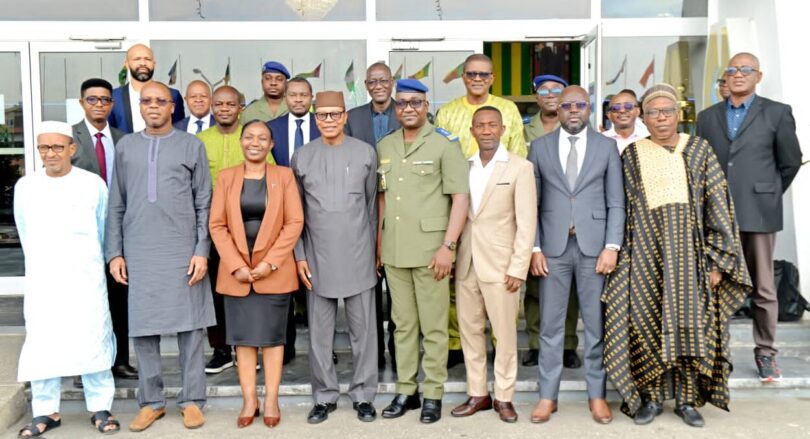Customs Directors General from Nigeria, Ghana and three neighbouring African countries have agreed to connect to the ECOWAS electronic Interconnected Transit Goods Management System (SIGMAT), regarding goods transiting the Abidjan-Lagos Corridor.
The agreement is aimed at easing trade on the corridor through the electronic sharing of information on goods in transit, as against manual documentation along borders, among others.
This was disclosed in a statement published on the ECOWAS website on Saturday.
The Customs Directors General from member states of the Abidjan-Lagos Corridor (Benin, Côte d’Ivoire, Ghana, Nigeria, and Togo) met in Lomé, Togo, to finalize the deployment of SIGMAT on their respective operations.
According to the statement, Customs Directors General from member states of the Abidjan-Lagos Corridor discussed the deployment of SIGMAT with a view to exploring ways and means of addressing obstacles to trade in goods on the said corridor.
The meeting is part of the part of the implementation of the recommendations of the ECOWAS Trade Liberalization Scheme Task Force (ETLS) ministerial meeting held in Cotonou from October 3 to 5, 2023.
In his opening address to the meeting, the Chairman of the ETLS, Dr. Mohammed Ibn Chambas, said that ECOWAS was founded on the dual promise of free movement and economic integration, with a view to achieving a peaceful and prosperous region.
He highlighted the SIGMAT system would fast-track revenue mobilization for the relevant stakeholders.
“That’s why, on behalf of the ETLS Task Force, he welcomed the SIGMAT initiative, which responds both to a concern for securing transit between member states, while also contributing to the mobilization of customs revenues essential to financing the development of our states.
“He reaffirmed the Task Force’s commitment to working alongside customs administrations for the full deployment of SIGMAT across the region,” the statement partly read.
At the end of the meeting, the participants were said to have agreed to adopt the SIGMAT e-hub by September 2024.
The statement partly reads,
“At the end of 48 hours of frank discussions, the customs administrations resolved to connect to the SIGMAT e-hub by the end of September 2024 and to organize SIGMAT awareness-raising and training activities for their partners and administrations.
“The participants also invited the ECOWAS Commission to take the necessary steps to get the other ECOWAS member states connected to the SIGMAT e-Hub by the end of September 2024, and to create a SIGMAT website to serve as a communication and information tool to ensure transparency in the operation of the transit solution.”
The SIGMAT system was launched by ECOWAS in March 2019 but years down the line, a number of the member states did not buy into it over bilateral and trade concerns.
The system interconnects customs IT systems of ECOWAS countries and enables stakeholders to track the flow of goods along the various road corridors thereby eliminating multiple checkpoints and load breaks at State borders.
As of 2023, the Customs Administrations of Benin, Burkina Faso, Côte d’Ivoire, Ghana, Guinea, Mali, Niger, Senegal and Togo accepted the deployment of SIGMAT.
On 8th and 9th June 2023, the customs administrations of Benin, Burkina Faso, Côte d’Ivoire, Ghana, Guinea, Mali, Niger, Senegal and Togo were contacted to work towards SIGMAT deployment at the Abidjan-Lagos Corridor.
The Corridor links Cote d’Ivoire’s commercial capital Abidjan, to Lagos in Nigeria, connecting Ghana (Accra), Togo (Lomé) and Benin (Cotonou).
The Abidjan-Lagos Corridor spans approximately 1,080 kilometres and is estimated to cost $ 15.6 billion, according to the African Development Bank.
It proposes to link some of Africa’s largest and most economically dynamic cities, including Abidjan, Accra, Cotonou, Lomé, and Lagos, upon completion.
It also encompasses a significant portion of West Africa’s population and connects bustling seaports serving landlocked countries, such as Burkina Faso, Mali, and Niger.
Eight months ago, the President of the African Development Bank (AfDB), Dr. Akinwumi Adesina, said that the Abidjan-Lagos highway corridor successfully secured $15.5 billion in investment interest.







